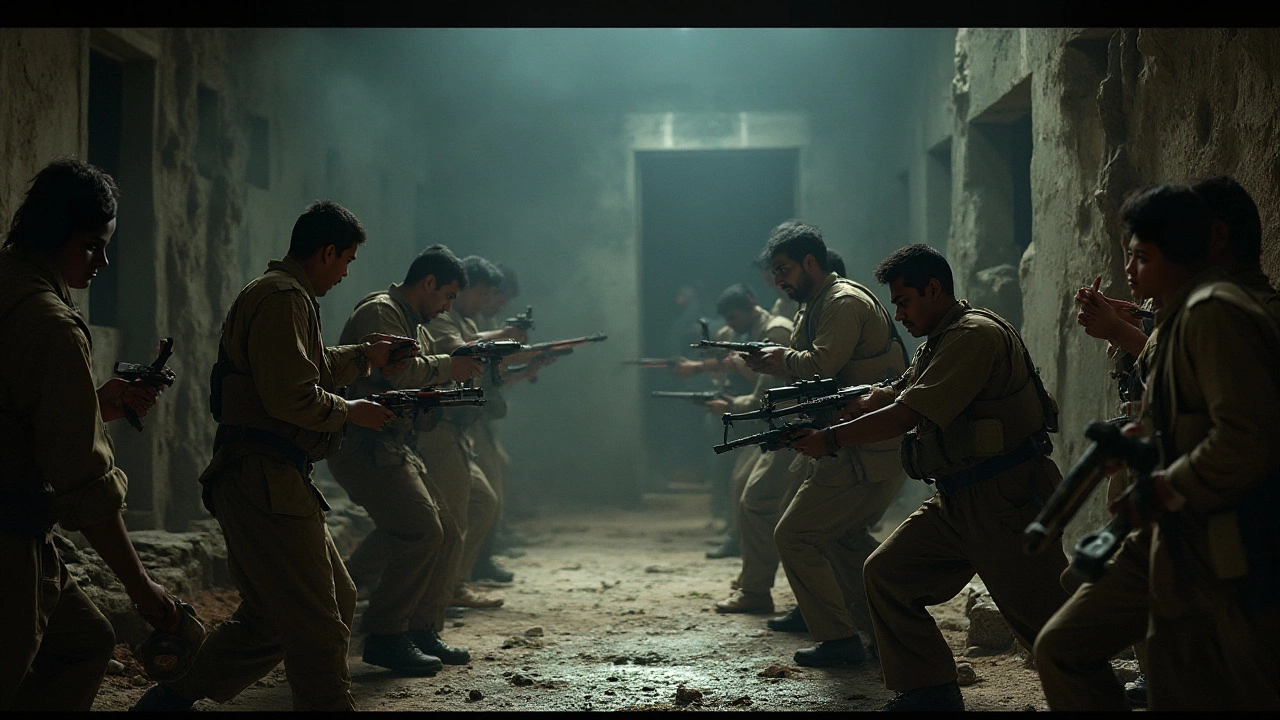
When people think of government jobs, they often imagine bureaucratic office roles or steadfast public servants. Yet, hidden beneath the regular job listings, there exists a realm of covert positions that hold immense responsibility and intrigue. These secret government jobs play pivotal roles in maintaining national security and intelligence operations.
From cryptographers decoding sensitive communications to field agents gathering critical intelligence on foreign soil, the variety of roles is as vast as they are secretive. While these positions require a high level of discretion and dedication, they also offer unique career paths for those driven by a purpose greater than themselves. This journey into the world of enigmatic government roles will shed light on what skills are needed and how one can navigate the path to serving in these undisclosed capacities.
- Introduction to Secret Government Jobs
- Types of Secret Government Jobs
- Skills and Qualifications Needed
- Challenges and Risks Involved
- How to Pursue a Career in Secret Government Work
Introduction to Secret Government Jobs
The world of secret government jobs is often veiled in mystery, guarded by layers of confidentiality and strict security protocols. These roles are crucial in safeguarding national interests, ranging from strategic intelligence gathering to the development of advanced technologies destined for espionage. Our curiosity might conjure images reminiscent of spy thrillers or diplomatic subterfuge, yet the essence of these careers is rooted in real-world challenges and high-stakes operations that demand precision and integrity.
Secret government positions are not just confined to the labyrinthine corridors of high-powered agencies like the CIA or MI6. They can be found across numerous government bodies, including defense departments, national laboratories, and even economic agencies. Such roles often require advanced clearance levels, extensive training, and a commitment to national service that surpasses conventional occupations. This world offers a stark contrast from your typical nine-to-five job, engaging instead in activities that directly influence global dynamics.
"In a world where invisibility has its costs, secret government jobs provide a critical backbone to a nation’s sovereignty and defense," said an analyst at a renowned intelligence agency.
Individuals drawn to this line of work must navigate complex bureaucratic landscapes to access these hidden opportunities. They are motivated not merely by compensation but by the allure of participating in operations cloaked in secrecy and significance. The harm of a slip-up in these jobs can ripple out in unforeseen ways, potentially affecting countless lives. Hence, the selection process is as rigorous as it is selective, ensuring only the most qualified and steadfast individuals assume such vital roles. In this context, ethical dilemmas are frequently encountered, adding another layer of complexity to these often unpredictable careers.
Indeed, becoming part of this esoteric world requires not only expertise and knowledge but also an unwavering resolve. Understanding the broad spectrum of undercover careers, you may encounter roles in cybersecurity defense to counter-espionage strategies, each offering a unique contribution to the tapestry of national security. While the risks one undertakes might be known to a select few, the gratification of accomplishing mission-critical tasks can overshadow the hazards involved. As one delves deeper into the hunts and missions of these professions, it's safe to say they underpin today's surprisingly interconnected world, maneuvering through backchannels that most remain unaware of.
Types of Secret Government Jobs
Secret government jobs come in many forms, each with its own unique set of responsibilities and challenges. These roles are critical to national security, often operating under the radar to protect citizens from a myriad of threats. At the forefront are intelligence roles, such as analysts who sift through vast amounts of data to uncover insights that could impact national policy or security. Their work is not just about collecting information but synthesizing it in a way that reveals hidden patterns or potential threats that may not be immediately obvious.
Undercover agents are another vital segment of secret government occupations. Their work can take them deep into hostile environments, interacting with dangerous individuals to gather crucial intelligence. This isn't just a job; it's a lifestyle that demands impeccable acting skills and the ability to remain calm and composed under intense pressure. A single misstep can risk exposure, putting not only the mission but also their lives in jeopardy. One might recall the brave operatives who infiltrated organized crime networks or extremist groups to bring criminals to justice.
"The intelligence work is plain and simple if you don't let others know your mission, you're more likely to succeed." - an experienced CIA Officer.
Cryptographers also play a significant role in the sphere of secret government jobs. In a world where information is power, securing communications from prying eyes is crucial. Cryptographers are tasked with designing and cracking codes which protect sensitive data. As technology evolves, so does the complexity of their work, necessitating constant advancements in their methods.
Beyond intelligence and fieldwork, there are also roles focused on covert operations planning and execution. These positions often require personnel to strategize missions from inception to completion, ensuring every variable is accounted for. Diplomats might leverage secretive channels to influence foreign powers discreetly, while cybersecurity experts shore up defenses against digital threats. For each position, a high level of secrecy is maintained, with personnel typically working under assumed identities to protect their actual affiliations.
Current estimates indicate that a significant portion of personnel in intelligence agencies are involved in cyber operations, as reflected in a recent allocation report:
| Operation Type | Personnel Allocation |
|---|---|
| Cybersecurity | 35% |
| Field Operations | 25% |
| Cryptography | 20% |
| Data Analysis | 20% |
Jobs within government intelligence are not only about espionage or combat tactics; multiple roles support the infrastructure that makes such operations possible. Whether it’s crafting the perfect cover story, piecing together clues from seemingly disconnected events, or maintaining the internal stability of displaced operatives, there's no doubt about the fascinating complexity behind these secretive careers. These agents and support staff are unsung heroes who rarely receive public accolades but make significant contributions to the safety and security of their nation.

Skills and Qualifications Needed
Embarking on a journey into the arcane world of secret government jobs requires a distinctive blend of skills and qualifications. Unlike conventional roles, these positions demand not only mental acuity and physical stamina but also a high degree of emotional intelligence. Candidates must possess a sharp analytical mind, capable of interpreting complex data and making swift, sound decisions. This is especially true for roles such as intelligence analysts, where being able to discern patterns and predict outcomes can make the difference between success and failure. Communication skills are equally vital, as conveying information succinctly and clearly is essential when dealing with encrypted messages or field reports.
Another crucial aspect is the ability to maintain confidentiality under all circumstances. This attribute often distinguishes successful candidates in secret roles. The government places immense trust in these individuals, relying on their discretion and integrity to safeguard sensitive information. Many of these jobs require high levels of security clearance, involving thorough background checks that delve into personal history, financial stability, and any potential vulnerabilities. A British intelligence officer once remarked,
'In this line of work, one's honor and ability to keep a secret is often worth more than any technical skill.'This creed highlights the profound responsibility bestowed upon such professionals.
Physical fitness can also play a pivotal role, particularly for field agents involved in covert operations. Training often includes rigorous exercises and specialized combat techniques to ensure preparedness for any situation. Moreover, linguistic skills are highly valued, with proficiency in multiple languages seen as a significant asset. This is crucial when assignments involve international stakes, requiring seamless access to different cultures and communications. Advanced degrees in fields such as cybersecurity, international relations, or criminal justice can provide a competitive edge, signifying a candidate's dedication and depth of understanding.
Candidates should also be adept at using advanced technological tools common in these fields. Expertise in cryptography, satellite surveillance, and cybersecurity measures are frequently sought after. Training in these areas might happen in-house, but foundational knowledge is typically expected beforehand. The clandestine nature of the work means that ongoing learning and adaptation are part of the job, as technologies and methodologies continuously evolve. Data from the Federal Career Service indicates that many positions require ongoing education to keep up with these shifts.
Finally, empathy and cultural sensitivity can set recruits apart, helping to build alliances and understand motivations on a global scale. It's a psychological game as much as a strategic one. As the nature of espionage and counterintelligence evolves, the successful operatives and analysts will be those who can not only adopt new technologies and methodologies but adapt to an ever-changing geopolitical landscape. This holistic approach towards qualifications ensures that those stepping into these roles are well-prepared, versatile, and capable of „performing“ in a wide range of scenarios.
Challenges and Risks Involved
Pursuing a career in secret government jobs requires not only exceptional skill but also a profound commitment to facing unique challenges and risks. These roles often demand a lifestyle that prioritizes national security over personal freedom, as the line between work and life can blur. Operatives may find themselves immersed in assignments that necessitate absolute confidentiality, where even the slightest misstep could compromise not only the mission but also national interests. The stakes are exceptionally high, requiring individuals to have immense emotional resilience and an ability to remain calm under pressure.
The nature of elucidating sensitive intelligence or going undercover poses formidable challenges. For one, operatives are often required to possess a robust understanding of diverse cultures and languages, which means extensive preparation and ongoing education. Living a dual life, particularly for field agents, can lead to significant psychological stress and feelings of isolation, as the importance of their work confines their personal interactions. Positions within covert operations also expose personnel to potential physical danger, depending on the nature of their assignments. As such, rigorous training and ongoing preparedness for adversarial environments are crucial components of their role.
Moreover, those in intelligence roles may wrestle with ethical dilemmas, balancing national security with civil liberties. According to the former CIA officer, Michael Hayden, "The challenge is maintaining our values without paralyzing our security."
Staying true to moral compasses while navigating complex geopolitical landscapes forms another layer of psychological challenge for those committed to these careers. Career progression in these roles may also be less straightforward, as credentials are often classified, making traditional merit acknowledgement difficult.
For some, the unpredictability of work hours and locations can lead to challenges in maintaining family and social relationships. This is not a conventional 9-to-5 existence and may often require those in undercover careers to be moved at a moment's notice, sometimes for extended periods. Agencies offer support systems, but the toll on personal life can be profound, requiring strong foundational support from loved ones at home. Beyond the human aspect, staying technologically ahead is an ongoing challenge in today’s rapidly evolving cyber-espionage world. Intelligence agencies must consistently adapt to tech advancements to prevent breaches and protect data critical to national security.
Overall, while the allure of these roles often shines through adventurous narratives seen in popular media, the reality involves confronting and overcoming significant risks daily. Being part of this clandestine world means that one's legacy lies not in public acclaim but in the silent assurance that their work quietly but powerfully shapes the fabric of national security.

How to Pursue a Career in Secret Government Work
Venturing into the shadowy corridors of secret government jobs requires more than just ambition; it demands a blend of specific skills, unwavering dedication, and the willingness to embrace the unknown. Many are drawn to this field by the allure of serving their country in ways that extend beyond the public eye, captivated by the stories of espionage and covert missions. Before diving headfirst into preparing for these roles, it's essential to gain a comprehensive understanding of what they entail. Typically, these jobs exist within intelligence agencies like the CIA, NSA, or their equivalents in other countries, where confidentiality is the cornerstone of their operations.
Begin by evaluating your educational and skill background. Most positions in this sphere require at least a bachelor's degree, sometimes rooted in fields like international relations, political science, or cybersecurity. However, technically inclined roles may call for degrees in computer science or engineering. Languages are precious assets here; being multilingual can significantly enhance your prospects. The government's need for specialists in critical languages like Arabic, Mandarin, or Russian reflects global geopolitical tensions, demanding a workforce skilled in these languages.
Networking within the field is also crucial. Attend job fairs that focus on government careers and intelligence seminars, allowing you to connect with professionals who live and breathe the world of covert operations. Often, these individuals provide insights that no textbook can, sharing details about the day-to-day realities that accompany such careers. Background checks are more stringent as you progress through the application process. Many roles necessitate top-secret security clearance levels, each requiring a comprehensive background investigation that could probe into the most personal aspects of your life.
"The essence of intelligence work lies not just in what you know and can do, but how you think about the unknown," says former CIA officer Michael Morell. His words underscore the mental agility required in these roles.
Securing a job in this selective arena also means preparing for and succeeding in various standardized tests tailored to the position type. Intelligence agencies often integrate analytical reasoning, psychological evaluations, and polygraph tests as hurdles. Each step serves a dual purpose: vet potential candidates and determine their suitability to handle classified information responsibly.
Consider internships or provisional assignments within government institutions to lay your foundation. These opportunities offer a glimpse into the inner workings of a secret government job while building your resume with relevant experience. Once inside, the career ladder can lead to more specialized roles, where ongoing learning is paramount. The landscape of international relations and security is perennially in flux, necessitating continuous professional development through courses, certifications, or even military training. This constant evolution is not just a requirement but a core aspect of thriving in such a clandestine environment.
In essence, pursuing a career in this secretive world is akin to embarking on a lifelong mission, one that mandates commitment, resilience, and discretion. The gratification of protecting your nation from unseen threats is profound, though naturally interwoven with risks and challenges. Equip yourself with the knowledge, skills, and connections necessary for success, and you might just find yourself living out the words of countless spies and operatives who have walked this path before you—a testament to human curiosity and resolve.
More Articles

Discovering the Indian State with the Most CBSE Schools
India's CBSE (Central Board of Secondary Education) is a prominent board known for its high educational standards. Some states have a higher density of CBSE schools, offering varied educational opportunities for students. Understanding which state leads in the number of CBSE schools can provide insights into educational trends and regional focuses in India's education system.

Which Branch of IIT is Toughest?
When it comes to choosing the toughest branch at the Indian Institutes of Technology (IIT), opinions vary widely depending on one's interests and strengths. This article explores the challenges and demands across different branches, with an objective focus on their rigor. Understanding the difficulty levels can help aspirants better prepare for their IIT JEE journey. We'll offer practical insights to guide students through deciding which path might be the best fit for them. Along the way, discover strategies for dealing with the rigors of whichever branch you choose.

CBSE Abroad: Is the CBSE Syllabus Really Available Outside India?
Curious if the CBSE syllabus is offered outside India? Learn where Indian students abroad can continue their CBSE education, which countries host CBSE-accredited schools, and what makes these schools tick. Find tips for spotting genuine CBSE institutions and the upsides and challenges for expat students. Get straightforward info on how to keep your studies on track wherever you are.
